Share
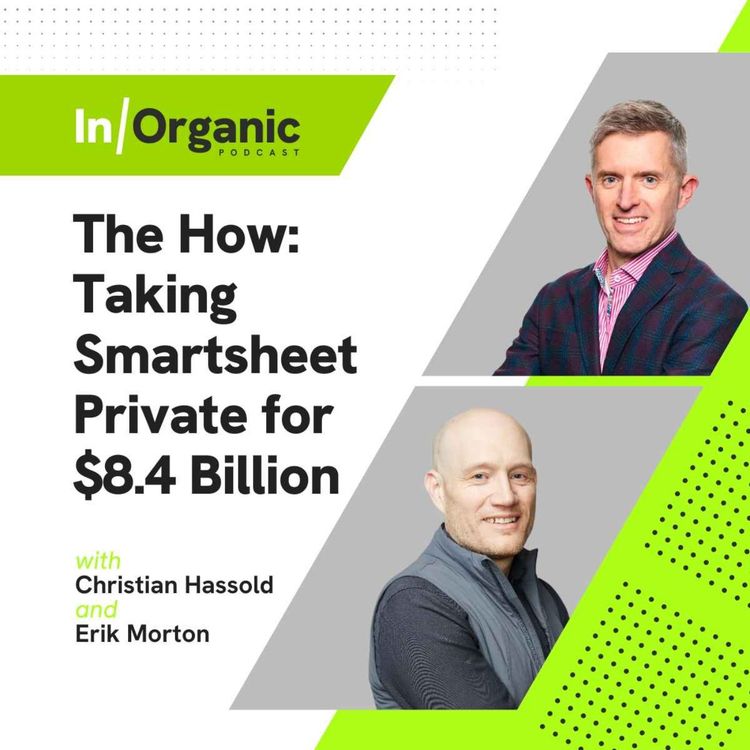
In/Organic Podcast
E20: The How: Taking Smartsheet Private for $8.4 Billion with Erik Morton
Summary
In this episode of the Inorganic Podcast, Christian and Erik delve into the complexities of take private transactions, using Smartsheet's recent acquisition as a case study. They discuss the economic challenges facing public companies, the lifecycle of a business transitioning from public to private, and the strategic considerations for boards contemplating such moves. The conversation highlights the importance of fairness opinions and the intricate dynamics of investor strategies in these transactions. In this conversation, Erik and Christian delve into the complexities of take-private transactions, focusing on the negotiation dynamics, the role of advisors, regulatory considerations, the impact on employees, and the financial structuring that influences investor returns. They use the Smartsheet deal as a case study to illustrate these concepts, providing insights into the motivations behind such transactions and the implications for all parties involved.
Takeaways
- Public companies face unique challenges that may lead them to consider going private.
- The lifecycle of a business includes transitioning from public to private ownership.
- Smartsheet's acquisition is a significant case study in the current market.
- Initiating acquisition conversations requires careful preparation and strategy. The Smartsheet deal features a go-shop provision allowing for additional bids.
- Advisors play a crucial role in take-private transactions, including bankers and consultants.
- Regulatory dynamics can complicate interactions between buyers and sellers.
- Employees in public companies face different equity compensation structures when taken private.
- Investor returns are influenced by the capital structure and debt servicing costs.
- The liquidity of equity compensation differs significantly between public and private companies.
Chapters
00:00 Introduction
04:04 Understanding Take Private Transactions
08:28 Analyzing the Smartsheet Case Study
15:53 Transaction Dynamics and Investor Strategies
20:44 How Fairness Opinion Works
23:28 Initiating Acquisition Conversations
29:18 Advisors in Take-Private Transactions
31:48 Do's and Dont's for Potential Acquirers
37:33 Impact of Take-Private Transactions on Employees
45:41 Erik Morton's Hypothetical Simple Exit Waterfall
51:38 Conclusion
Connect with Christian & In/organic Podcast
Christian's LinkedIn: https://www.linkedin.com/in/hassold/
In/organic on LinkedIn: https://www.linkedin.com/company/inorganic-podcast
In/organic on YouTube: https://www.youtube.com/@InorganicPodcast/featured
Connect with E20 guest, Erik Morton on LinkedIn
https://www.linkedin.com/in/erikimorton/
Episode References
https://investors.smartsheet.com/news/news-details/2024/Smartsheet-to-be-Acquired-by-Blackstone-and-Vista-Equity-Partners-for-8.4-Billion/default.aspx
https://www.wsj.com/articles/smartsheet-to-be-taken-private-by-pe-firms-in-8-4-billion-deal-7296758c
More episodes
View all episodes
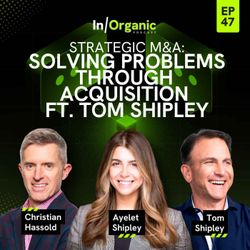
E47: Solving Problems Through Acquisition ft. Tom Shipley
41:16|In this engaging episode, co-hosts Ayelet Shipley and Christian Hassold welcome Tom Shipley to share his journey of building and scaling businesses through acquisitions. He discusses the challenges and opportunities in mergers and acquisitions (M&A) present, emphasizing the importance of strategic thinking and relationship building. The conversation also explores partnership dynamics and the role of external partners in resolving conflicts. Tom highlights the power of acquisitions in overcoming business challenges and achieving growth, offering insights into the process of identifying and acquiring businesses.TakeawaysAcquisitions can solve almost every business challenge.Partnership dynamics often require external mediation.Strategic thinking is crucial in M&A.Building relationships is key to successful acquisitions.Acquisitions offer a faster path to business growth.Understanding seller motivation is essential in deals.Partnership conflicts can hinder business progress.Acquisitions can provide liquidity and strategic opportunities.Chapters00:46 Tom Shipley’s Path Into M&A01:38 The First Acquisition That Changed Everything05:34 Using Acquisitions to Solve Cash and Capability Gaps08:28 Buy vs. Build: Rethinking Entrepreneurship09:37 Seller Motivation and Why Deals Exist Everywhere11:50 Organic Growth vs. Acquisition Math13:41 Partnership Misalignment as a Growth Blocker14:21 How M&A Can Resolve Partner Deadlock19:26 Mergers as a Reset for Growth and Liquidity28:40 The Valley of Despair for Mid-Market Founders29:45 Buying the Next Chapter vs. Starting Over31:50 Where to Find Acquisition Opportunities37:49 Adding a Zero: Expanding the Mental Model39:44 DealCon, Reources, and CommunityConnect with Christian and AyeletAyelet’s LinkedIn: https://www.linkedin.com/in/ayelet-shipley-b16330149/Christian's LinkedIn: https://www.linkedin.com/in/hassold/Web: https://www.inorganicpodcast.coIn/organic on YouTube: https://www.youtube.com/@InorganicPodcast/featuredConnect with Tom Shipleyhttps://www.linkedin.com/in/t-shipley/
E46: The UK Independent Agency Scene w/Robin Skidmore, CEO Journey Further
50:53|In this episode of the Inorganic Podcast, co-host Christian Hassled interviews Robin Skidmore, a seasoned entrepreneur and the founder and CEO of Journey Further. They discuss Robin's journey from humble beginnings to founding successful agencies, including Epiphany Search and Journey Further. The conversation explores the evolution of Journey Further, its recent acquisition of Salderson Media, and the challenges of expanding into the U.S. market. Robin shares insights on agency culture, the current state of the UK agency market, and the importance of adapting to changes in consumer behavior and technology, particularly AI. The episode concludes with a discussion on Robin's investments in startups and the significance of maintaining a strong company culture as the agency grows.TakeawaysRobin Skidmore's entrepreneurial journey began with a car wash at age 12.Journey Further was launched in 2017 with a clear roadmap for growth.The agency focuses on performance media and aims to be creatively driven.Acquisition of Salderson Media was strategic for expanding capabilities.Expanding to the U.S. market presented unique challenges and cultural differences.Maintaining a strong company culture is crucial for agency success.The UK agency market is experiencing consolidation and increased competition.AI is transforming the marketing landscape, requiring agencies to adapt.Investing in startups allows for a deeper understanding of client challenges.Cultural dynamics influence agency operations and client relationships.Chapters00:00 Introduction to Robin Skidmore and Journey Further02:14 Robin's Entrepreneurial Journey and Epiphany Search04:52 The Evolution of Journey Further08:13 Acquisition of Salderson Media and Market Relevance10:32 Expanding to the U.S. Market: Challenges and Insights17:31 Cultural Differences in Agency Operations20:16 Lessons from Epiphany to Journey Further23:29 The State of the UK Agency Market26:21 Future Growth Strategies and Inorganic Expansion30:28 Cultural Dynamics in Agency Growth34:21 Investments Beyond Agencies: The Pub and Startups41:22 Maintaining Culture and Addressing AI ChallengesConnect with Christian and AyeletAyelet’s LinkedIn: https://www.linkedin.com/in/ayelet-shipley-b16330149/Christian's LinkedIn: https://www.linkedin.com/in/hassold/Web: https://www.inorganicpodcast.coIn/organic on YouTube: https://www.youtube.com/@InorganicPodcast/featured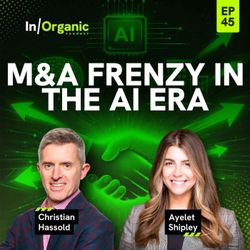
E45: M&A Frenzy in the AI Era
31:28|In this episode, co-hosts Ayelet Shipley and Christian Hassold delve into AI related acquisitions, particularly focusing on outsized valuation multiples and whether they are sustainable or extensible to the digital agency sector. They discuss the valuation multiples seen in recent AI focused acquisitions led by Meta, Nvidia, Cvent, and OpenAI, and opine on the race for talent in the AI era. The conversation highlights the evolving landscape of agency capabilities in the face of AI advancements and the potential for consolidation in the market. The hosts also explore the future of digital agencies and the opportunities that lie ahead for strategic acquirers in the AI domain.TakeawaysAI is driving significant M&A activity in the tech sector.Recent acquisitions show high valuation multiples for AI companies.The trend of acquiring talent over products is prevalent in AI M&A.Digital agencies must adapt to the changing landscape influenced by AI.There is a potential consolidation in the agency market due to AI advancements.Strategic acquirers are looking for speed to market through AI capabilities.The valuation of AI startups is often based on capital raised rather than revenue.The market for AI capabilities in agencies is still developing.Founders may need to be realistic about their exit multiples in the current environment.The future of digital agencies will be shaped by AI innovations.Chapters00:00 Introduction to AI Trends01:03 M&A Activity in AI05:16 Valuation Multiples in AI Acquisitions11:00 The Talent Acquisition Race15:18 AI's Impact on Agencies19:07 Future of Digital Agencies25:01 Opportunities in AI AcquisitionsConnect with Christian and AyeletAyelet’s LinkedIn: https://www.linkedin.com/in/ayelet-shipley-b16330149/Christian's LinkedIn: https://www.linkedin.com/in/hassold/Web: https://www.inorganicpodcast.coIn/organic on YouTube: https://www.youtube.com/@InorganicPodcast/featured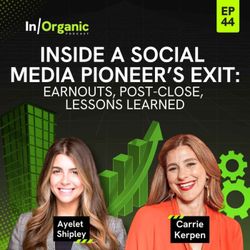
E44: Inside a Social Media Agency Pioneers Exit: Earnouts, Post Close, Lessons Learned
28:46|In this episode of the Inorganic Podcast, co-host Ayelet Shipley interviews Carrie Kerpen, a pioneer in social media and co-founder of Likeable Media. They discuss Carrie's journey from starting a social media agency to successfully exiting the business. Carrie shares insights on the importance of profitability, setting exit goals, choosing the right M&A advisor, and negotiating earn-outs. She reflects on her experiences and the lessons learned, particularly for women entrepreneurs, and emphasizes the need for community and support in the business world.TakeawaysCarrie started Likeable Media in 2007, one of the first social media agencies.The initial focus was not on exiting but on building a profitable business.Setting a target exit value can help guide business decisions.Timing and personal readiness are crucial when deciding to sell a business.Choosing the right M&A advisor can significantly impact the sale process.Negotiating earn-outs requires careful consideration of control and reporting.Reflecting on the exit process can reveal areas for improvement.Building a community for women founders can provide essential support.Women entrepreneurs often face unique challenges in the exit process.M&A can be a powerful tool for business growth and problem-solving.Chapters0:00 Introducing Carrie Kerpen1:05 Founding Likeable Media 3:33 Early Growth & Cash Flow Challenges5:22 Becoming CEO and Focusing on Profitability6:37 Market Shifts & Productizing the Agency7:21 Building a Brand through All the Social Ladies9:07 Financial Stability & the $20M Exit Goal 10:43 Knowing When It's Time to Sell12:55 Choosing an M&A Advisor vs. a Banker15:36 Price vs. Timing After the Exit18:22 Negotiating & Protecting an Earnout22:02 Life After the Sale23:12 What Carrie Would Do Differently24:51 Acting Like a Platform and Rethinking Capital25:58 The Exit Gap and The Whisper Group27:45 Closing ThoughtsConnect with Christian and AyeletAyelet’s LinkedIn: https://www.linkedin.com/in/ayelet-shipley-b16330149/Christian's LinkedIn: https://www.linkedin.com/in/hassold/Web: https://www.inorganicpodcast.coIn/organic on YouTube: https://www.youtube.com/@InorganicPodcast/featuredConnect with guest, Carrie Kerpenhttps://www.linkedin.com/in/carriekerpen/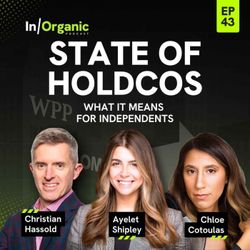
E43: State of Holdcos and What it Means for Independents w/Chloe Cotoulas of Everos
37:43|SummaryIn this episode of the Inorganic Podcast, co-hosts Christian Hassold and Ayelet Shipley chat with Chloe Cotoulas, Partner at Everos Group and an investment banker with a diverse background in advertising and finance. On this episode they discuss Chloe's unique career path, the evolution of holdcos in the advertising industry, and the impact of market trends on large-scale independent agencies. The conversation also explores the future outlook for deal activity in the coming quarters, emphasizing the importance of AI and experiential marketing in shaping the industry.TakeawaysChloe transitioned from a creative background to investment banking.The convergence of creativity and business is crucial in today's market.Holdcos are facing challenges due to changing market dynamics.AI is reshaping the advertising landscape and agency operations.Experiential marketing is becoming central to brand strategies.The enterprise value of agencies is often misrepresented in the market.Private equity is increasingly interested in the advertising ecosystem.Founders are reconsidering their exit strategies in light of market changes.The importance of financial performance in upcoming deal activity is paramount.Prompt engineering is emerging as a valuable skill in the creative industry.Chapters00:52 Chloe Cotoulas' Presidential Writing Experience05:07 Chloe’s Career Path from Creative to Finance10:04 Holdco Shakeups, IPG–Omnicom, & WPP17:26 How Market Turmoil Impacts Independents19:03 New Buyers & Founder Mindset 22:38 Selling to Holdcos vs. Challenger Networks24:15 The Rising Trend of Experiential + Social30:19 Deal Flow Outlook for the Next Two Quarters32:45 AI Opportunity: Differentiation & Acceleration33:24 AI Risks, Defensibility, & Prompt Engineering36:51 Closing Thoughts Connect with Christian and AyeletAyelet’s LinkedIn: https://www.linkedin.com/in/ayelet-shipley-b16330149/Christian's LinkedIn: https://www.linkedin.com/in/hassold/Web: https://www.inorganicpodcast.coIn/organic on YouTube: https://www.youtube.com/@InorganicPodcast/featuredConnect with guest, Chloe Cotoulashttps://www.linkedin.com/in/chloe-cotoulas-92082861/
E42: Deal Reveal - Wpromotes' Acquisition of Giant Spoon
34:43|In this episode, co-hosts Ayelet Shipley and Christian Hassold discuss WPromote's acquisition of Giant Spoon. They delve into the intricacies of the acquisition process, emphasizing the importance of trust and the contributions of a strong deal team. The conversation also touches on market reactions to the acquisition and the importance of post-merger integration planning. The hosts conclude with reflections on lessons learned and future goals for the newly formed agency.TakeawaysThanksgiving cooking hacks can lead to perfect meals.The acquisition of Giant Spoon by WPromote is a significant industry move.Trust and communication are crucial in the deal process.Shared expectations workshops can enhance collaboration.Having a partner to navigate complex P&Ls is critical to navigating technical financial discussions in a deal processMarket reactions can provide insights into industry perceptions.The integration process should be planned from the start.Maintaining brand identity is important post-acquisition.Future goals and objectives are vital for continued growth.Chapters00:00 Thanksgiving Reflections and Cooking Hacks02:12 Major Acquisition Announcement: WPromote and Giant Spoon05:05 The Search for the Right Agency: A Corporate Development Journey10:08 Navigating the Deal Process: Trust and Communication17:31 Building Trust: Shared Expectations Workshop21:30 Challenges and Insights from the Deal Process25:05 Market Reactions and Industry Perspectives29:21 Final Thoughts and Future GoalsConnect with Christian and AyeletAyelet’s LinkedIn: https://www.linkedin.com/in/ayelet-shipley-b16330149/Christian's LinkedIn: https://www.linkedin.com/in/hassold/Web: https://www.inorganicpodcast.coIn/organic on YouTube: https://www.youtube.com/@InorganicPodcast/featuredEpisode ReferencesAd Age Deal AnnouncementGE’s Opening Day Commercial by Giant Spoon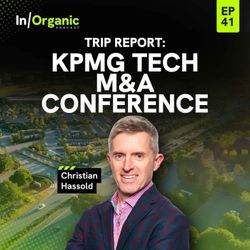
E41: KPMG Tech M&A Conf & SaaS M&A Market Update
39:10|SummaryIn this episode of the In/organic Podcast, co-host Christian Hassold shares insights from the KPMG Technology M&A Conference, discussing the current landscape of mergers and acquisitions, particularly in the tech sector. In this episode, Christian shares highlights from the conference, including the pervasive influence of AI on M&A decisions, the challenges and opportunities presented by the AI investing landscape, and the importance of creative deal structures in navigating the current market dynamics. The episode also covers the “operator's dilemma” faced by CEOs - that is, the rise in peer pressure to do M&A, and what are the best practices are from leading strategics. Finally, Hassold provides an overview of current B2B SaaS deal activity and market trends based on Pitchbook data.TakeawaysThe KPMG M&A Conference provided valuable insights into current market dynamics.AI is a major factor influencing M&A decisions and strategies.VCs are increasingly making investments in AI startups without getting governance rights, and not always checking the underlying economics of the businessThe operator's dilemma highlights the challenges that CEOs face in mergers and acquisitions (M&A).Corporate development roles are seeing a significant increase in demand.Top CEOs simplify their M&A strategies to focus on core problems.Deal activity in the tech sector is on the rise, indicating a healthy market.Earnouts are becoming a significant component of deal structures.Chapters00:00 Introduction and Context of the Episode02:50 Insights from the KPMG M&A and Tech Conference06:04 AI's Pervasive Influence on Tech and M&A08:54 The AI Investing Landscape11:40 Deal Structures Sparking Innovation16:42 The Operator's Dilemma in M&A21:48 Corporate Development and Deal Activity24:38 Priorities in M&A for Corporates vs. Private Equity29:19 Case Studies of Successful M&A Strategies32:59 Market Update on Deal Activity and EarnoutsConnect with Christian and AyeletAyelet’s LinkedIn: https://www.linkedin.com/in/ayelet-shipley-b16330149/Christian's LinkedIn: https://www.linkedin.com/in/hassold/Web: https://www.inorganicpodcast.coIn/organic on YouTube: https://www.youtube.com/@InorganicPodcast/featuredEpisode ReferencesKPMG M&A Conference AgendaKPMG 2025 Deal Market Study (buyer priorities)Kirkland & Ellis M&A Bring Down Report 2025 (earnout data)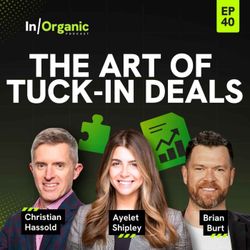
E40: The Art of Tuck-in Deals w/Brian Burt of Canopy Management
37:31|SummaryIn this episode of the Inorganic Podcast, co-hosts Ayelet Shipley and Christian Hassold welcome Brian Burt, founder & CEO of Canopy Management. In this episode, we discuss Brian's entrepreneurial journey, with an emphasis on his principles for building the business and expanding through highly accretive tuck-in M&A transactions. Brian also shares the importance of cultural fit in successful integrations. He then discusses the challenges and opportunities presented by AI in the retail media space, emphasizing the need for omnichannel marketing strategies. The conversation underscores the importance of momentum in business and the role of performance-based incentives in sustaining an entrepreneurial spirit within acquired teams.TakeawaysCanopy Management has grown without external investment, focusing on mergers and acquisitions for expansion.The need for operational efficiency and scalability drove the first acquisition.Cultural fit and shared values are crucial in successful acquisitions.Integrating new teams requires clear communication and defined outcomes.Performance-based incentives help maintain entrepreneurial spirit in acquired teams.AI presents both a threat and an opportunity for the agency space.Omnichannel marketing is essential for modern e-commerce success.Building a strong personal brand aids in building an acquisition funnelMomentum in business is key to successful integration and growth.?Chapters00:26 Brian Burt’s Background 02:38 Growing through M&A 12:31 Culture Fit and Founder Alignment13:09 Integrating the First Acquisition16:36 Defining and Executing Acquihires20:45 Evolving the Playbook23:46 Incentives Pods, and Integration Strategy27:44 Scale Synergy and Sustainable Growth31:28 Market Outlook: Retail Media Omnichannel and AI37:14 Closing Thoughts and TakeawaysConnect with Christian and AyeletAyelet’s LinkedIn: https://www.linkedin.com/in/ayelet-shipley-b16330149/Christian's LinkedIn: https://www.linkedin.com/in/hassold/Web: https://www.inorganicpodcast.coIn/organic on YouTube: https://www.youtube.com/@InorganicPodcast/featuredConnect with guest Brian Burthttps://www.linkedin.com/in/brianburt1/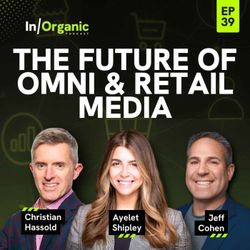
E39: The Future of Omni & Retail Media w/Jeff Cohen
43:15|SummaryOn this episode of the Inorganic Podcast, co-hosts Christian Hassold and Ayelet Shipley are joined by guest Jeff Cohen, newly minted Chief Business Development Officer of Skai, former Principal Evangelist for Amazon Ads, and in general a seasoned operator with an extensive background in commerce and tech. In this episode, the hosts and guest explore the current state and future vision of omnichannel commerce. Their discussion spans the immediate and long-term prospects of retail media agencies and the defensibility of these businesses based on their commonly observed category-specific expertise. As a part of this discussion, they talk about notable retail media agencies including Podean, Cartograph, and Envision Horizons. The conversation emphasizes the need for agencies to adapt and innovate in a rapidly changing market.TakeawaysE-commerce is growing at a rate of 6-8%.Retail media is experiencing growth rates in the low to mid 20s.Omnichannel connectivity is crucial for brands.Brands often underutilize Amazon's audience capabilities.Organizational silos hinder effective marketing strategies.Audience planning is essential for successful media execution.Agencies should act as partners, not just service providers.The future of retail media agencies is evolving rapidly.AI can significantly enhance operational efficiency in marketing.Chapters01:01 Introduction & Why Omnichannel Commerce Matters02:40 Jeff Cohen’s Journey04:46 The Growth of Commerce Talent05:58 Defining Omnichannel Commerce07:39 Are Brands Underutilizing Amazon’s Potential?11:58 Balancing In-House and Agency Collaboration14:21 Audience Planning: The Core of Retail Media18:31 How Retail Media Agencies Differentiate and Mature22:00 The Future of Agencies with AI & Tech34:07 Inside Skai: AI Tools and Omnichannel Evolution37:25 Platform Strategy & The Broader Tech Landscape 40:40 Closing Reflections & TakeawaysConnect with Christian and AyeletAyelet’s LinkedIn: https://www.linkedin.com/in/ayelet-shipley-b16330149/Christian's LinkedIn: https://www.linkedin.com/in/hassold/Web: https://www.inorganicpodcast.coIn/organic on YouTube: https://www.youtube.com/@InorganicPodcast/featuredConnect with guest Jeff Cohenhttps://www.linkedin.com/in/jeffreycohen/